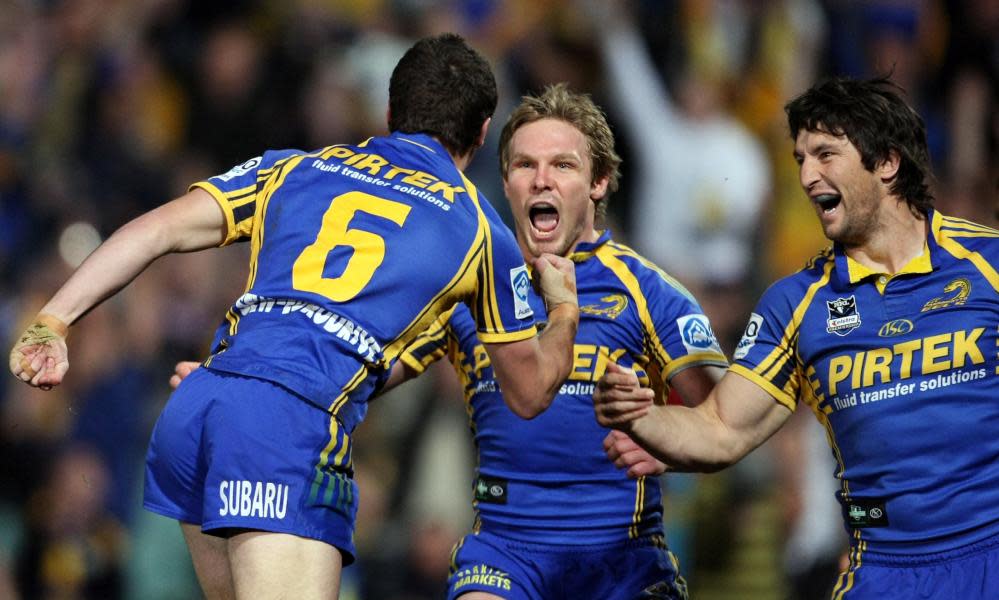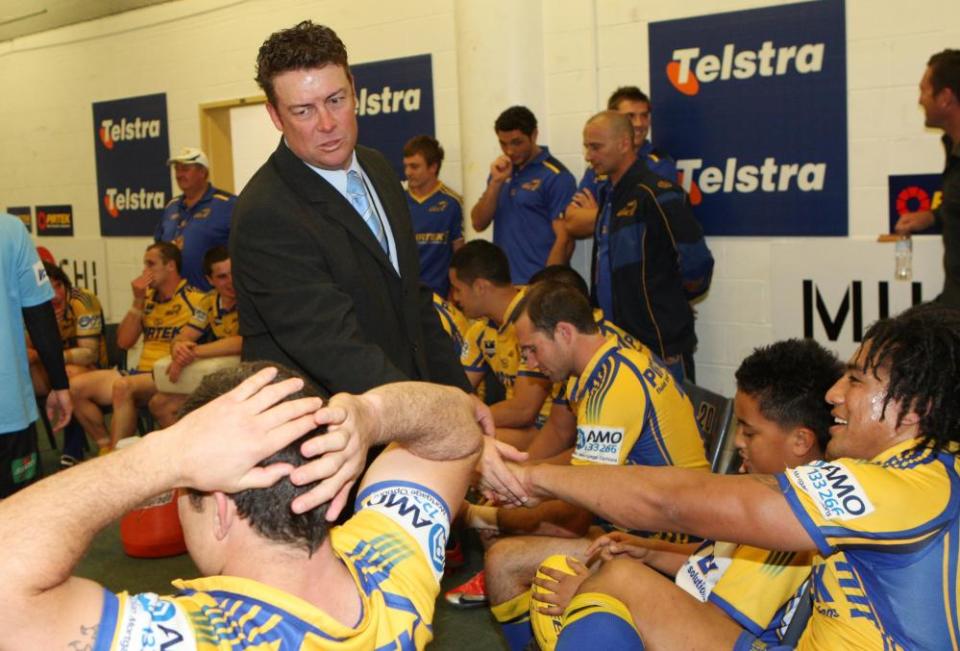Party like it’s 2009: the heady ride to Parramatta’s last NRL grand final

Thirty-six years is a long time for anybody. For an NRL club, it is an age. For Parramatta, it’s an eternity. The Eels fraternity have felt every ebb and flow since 1986, the year of their last premiership and the final of four titles during the fruitful 1980s.
In the parched decade that followed they felt the increasingly intense desperation to reincarnate the version of Peter Sterling who had made all that magic happen. And they have keenly felt the abyss that stretched into the noughties and beyond, and could – finally – be remedied by the time this Sunday’s grand final against Penrith is run and done.
The Eels have always chased a great redeemer. In 1997 it was coach Brian Smith, who took the club to seven finals appearances, two minor premierships and one grand final – yet, alas, no premiership. When patience ran out, Smith was told the 2006 season would be his last. By mid-May, after two wins in nine rounds and his position rendered untenable, Smith resigned. Jason Taylor took over on an interim basis and steered them to an eighth-place finish.
When Taylor went to South Sydney (where he was later sacked for what he described as “pretend lightweight, kung fu play”), Michael Hagan turned up from Newcastle to deliver a preliminary final (in 2007) and then an ignominious 11th (2008). Then out the door he went.
Seething, ever-impatient, the roving eyes of Eels’ suits found 41-year-old Daniel Anderson, the man who had coached the Warriors to the 2002 decider and been named that season’s Dally M coach of the year. He came from St Helens in 2009, having won the British club three Challenge Cups, a grand final and a World Club Challenge over Brisbane Broncos.
Having previously served at Parramatta as assistant to Smith and a reserve-grade coach, he had the pedigree. And he proved to be the almost great redeemer. A mentor big on discipline, punctuality and honesty. Truths were told. Some players had not known such bluntness. Every day was boot camp. It wasn’t fun.

But one man revelled in it: Nathan Hindmarsh. The 29-year-old veteran back-rower had played under Anderson as a junior coach and knew what he was about. “Daniel just kept it simple: if you don’t aim up, if you don’t perform, you’ll get dropped,” Hindmarsh tells Guardian Australia. “I liked it. It worked for me.”
At first, at least, it didn’t appear to work for others. By the middle of July the Eels were second-last and friendless. Players were restless. The club told 22-year-old Kiwi international, Krisnan Inu, he was free to go elsewhere.
Then, as if from nowhere, on a Monday night doubling as Hindmarsh’s 250th game, Parramatta beat the powerful Melbourne Storm 18-16. A week later it was the high-flying Bulldogs, dusted 27-8. It was, as Inu said at the time, “fun again”. After that they went gangbusters. Goodnight and thanks for coming Sharks (30-0), Knights (40-8), Warriors (40-4), Tigers (26-18) and Panthers (48-6).
Parra fans are great at celebrating. They’ll celebrate all week before a grand final
Nathan Hindmarsh
It is difficult to fully describe the booming success of this campaign without mentioning Jarryd Hayne, the then 21-year-old tearaway who won the 2009 Dally M medal. But it is more difficult still to celebrate Hayne’s achievements given he is due to face a third trial on sexual assault allegations from 2018, for which he served jail time before the New South Wales court of criminal appeal quashed his convictions and ordered a retrial. Hayne has always maintained the encounter was consensual and is pleading not guilty.
Regardless, Parramatta had many other contributors. Hindmarsh would never stop. Nathan Cayless was unyielding. Fuifui Moimoi was at the peak of his barnstorming powers, smashing into the middle of the ruck on crowd-pleasing runs before playing the ball quickly. His fellow front-rower, Tim Mannah, in his first year of first grade, would follow in less stylish though no less effective fashion. And a spunky kid with a Bulldogs pedigree, Daniel Mortimer, would back up offloads. It was a heady combination. Up the ladder they went, and up league fans went with them.
By late August, the Eels had such momentum that their final-round match against minor premiers St George Illawarra at Kogarah Oval drew a record free-to-air TV audience. The Saints won 37-0. A week later, when the same teams met at the same venue, Parramatta walked away 25-12 victors.
Related: Nathan Cleary, the perfectionist who can win Penrith the NRL grand final | Nick Tedeschi
After despatching Gold Coast Titans – who had been in the competition three years and were good enough to run third – it was onwards to Stadium Australia for the preliminary final against the heavily favoured Bulldogs. The latter had enjoyed a stellar season and a week off. Hindmarsh doesn’t remember much from his team’s golden run. He hardly even remembers his 250th appearance against the Storm. But he does remember the Dogs game.
“We ran out into a wall of noise,” he says. “The first thing I noticed was they’d split the supporters down the middle so you could see where the fans were. It was two local clubs, rivals, all that history from the ’80s. It was enormous.” When Parramatta won 22-12 their fans, he says, “went berserk”. “Parra fans are great at celebrating; they’ll celebrate all week before a grand final.”
The celebrating would not continue after the big dance. The Eels bandwagon came to a standstill against a ruthless Storm, who had a team so stacked it was later deemed illegal, and who survived a late Eels surge to reign 23-16.
Hindmarsh would play 330 NRL games for Parramatta, none of which – as he is often ribbed about - would be a win in a grand final. Still, he looks back on 2009 with fondness.
“Considering where we came from and the teams we knocked off along the way, it was a great run,” he says. “We’d have loved to have gone all the way, but unfortunately we couldn’t. But mate, it’s something that fans still talk about today.”

 Yahoo Movies
Yahoo Movies 
